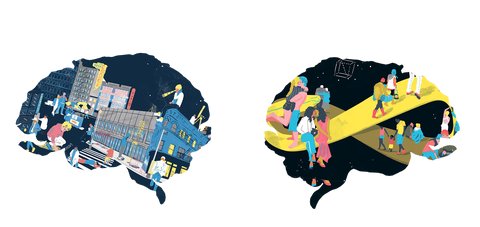Research

Human minds have an ordinary superpower: we quickly and flexibly form mental representations of people, groups, and situations to navigate a complex social world. We owe this feat to cognitive systems that have evolved to meet the demands of group living, helping us form inferences about people (is she wise?), reason about group norms (should wizards be wise?), and construct our sense of self (am I wise enough to be a good wizard?). But where do these inferences come from? What do they actually reveal? And how might social and situational contexts transform the way we make and act on these inferences?
To answer these questions, the SoCoSci lab investigates how people flexibly construct representations of themselves and others to make sense of the social world. Much of our work seeks to understand how our minds shape this social world, and are shaped by it in turn. Ultimately, we aim to help people explore new ways of knowing and being, in service of social coordination and change.
What are some broad questions that interest your lab?
What challenges the way we perceive others or ourselves? How do structural biases in social contexts constrain our ideas, identities, and well-being? How might our ideas about others get inverted back onto ourselves? Ultimately, how can we intervene on these biases to become more deliberate co-authors of a shared social reality?What are some theoretical commitments in your lab?
Our work takes seriously the idea that social reality is co-constructed and accessed through biased processes—efficient but imperfect cognitive systems interacting with biased information structures in our social environment. By tracing our explicit thoughts and implicit thought structures to their origins, such as by connecting individuals' mental representations to collective narratives in society, we aim to shed light on how these biases operate and to identify ways to change them (for instance, expending effort to change our cognition or to change how information is structured in our social environment).What methods do you use?
Research in the lab draws on an interdisciplinary toolkit spanning social psychology, cognitive science, philosophy, statistics, and data science. Using diverse methods such as large-scale behavioral experiments, longitudinal experience-sampling, "big data" archival analysis, narrative analysis, and computational modeling, we aim to advance better models of social cognition. These methods, combined with international collaborations and open, reproducible research practices, represent our current best approach to conducting rigorous and socially responsible science.At the heart of our work is a focus on variability—not just as noise, but as a fundamental feature of cognition. This focus drives us to build more inclusive, adaptable models of human social cognition. Throughout our work, we strive to stay responsive to the ways that culture and power shape the questions we ask and the methods we use.